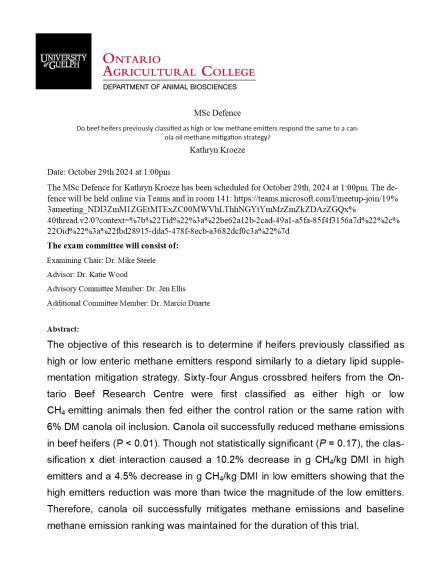Kathryn Kroeze MSc Defence
Date and Time
Location
141 and Teams: https://teams.microsoft.com/l/meetup-join/19%3ameeting_NDI3ZmM1ZGEtMTExZC00MWVhLThhNGYtYmMzZmZkZDAzZGQx%40thread.v2/0?context=%7b%22Tid%22%3a%22be62a12b-2cad-49a1-a5fa-85f4f3156a7d%22%2c%22Oid%22%3a%22fbd28915-dda5-478f-8ecb-a3682dcf0c3a%22%7d

Details
Do beef heifers previously classified as high or low methane emitters respond the same to a canola oil methane mitigation strategy?
The objective of this research is to determine if heifers previously classified as high or low enteric methane emitters respond similarly to a dietary lipid supple-mentation mitigation strategy. Sixty-four Angus crossbred heifers from the On-tario Beef Research Centre were first classified as either high or low CH4 emitting animals then fed either the control ration or the same ration with 6% DM canola oil inclusion. Canola oil successfully reduced methane emissions in beef heifers (P < 0.01). Though not statistically significant (P = 0.17), the clas-sification x diet interaction caused a 10.2% decrease in g CH4/kg DMI in high emitters and a 4.5% decrease in g CH4/kg DMI in low emitters showing that the high emitters reduction was more than twice the magnitude of the low emitters. Therefore, canola oil successfully mitigates methane emissions and baseline methane emission ranking was maintained for the duration of this trial.